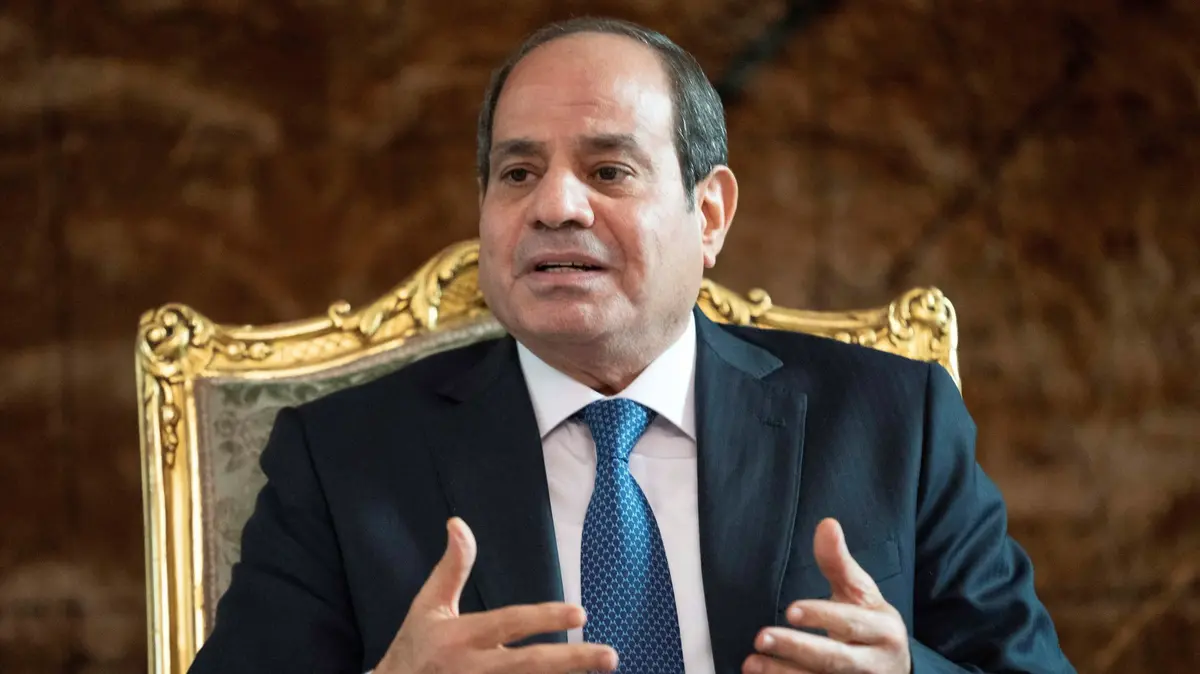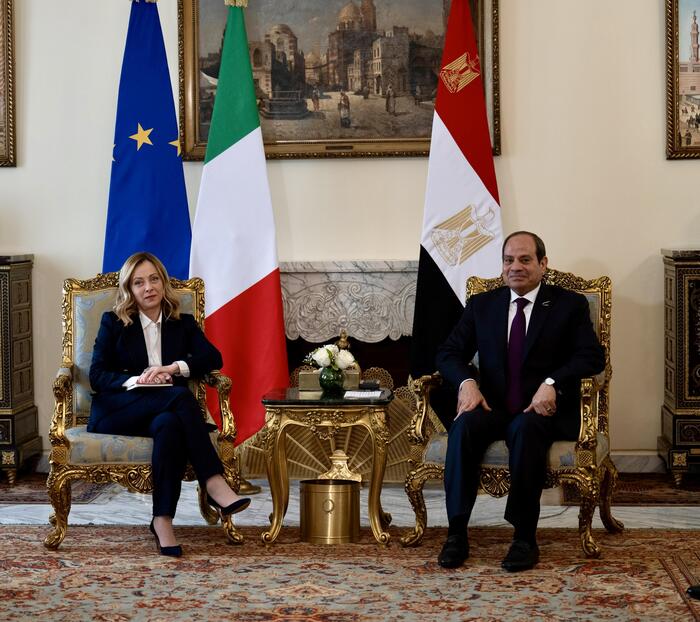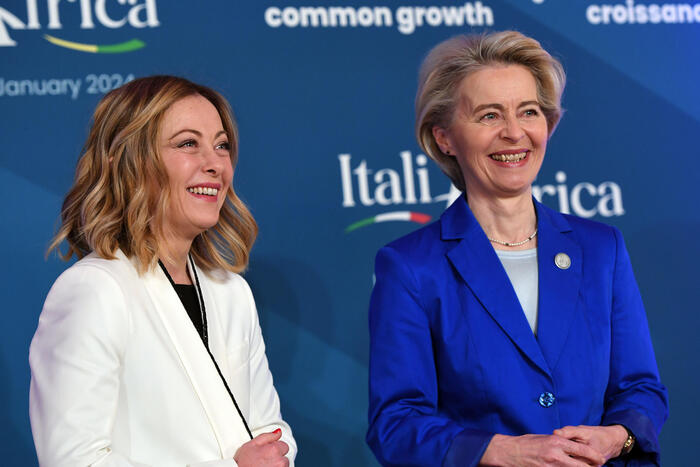Cairo -
In September 2021, Egyptian President Abdel Fattah El-Sisi launched the National Strategy for Human Rights, as "the first self-integrated and long-term plan in the field of human rights in Egypt," which is based on a five-year time frame that ends by September 2026.
Two days ago, the Permanent Committee for Human Rights (headed by Foreign Minister Sameh Shoukry) announced the results of its first year, amid a human rights and political controversy over those results.
Al-Sisi had met hours before he went to Washington - to attend the summit of the leaders of the United States and Africa - with Shoukry, who showed him the "first executive report of the National Strategy for Human Rights."
And according to what was announced by the spokesman for the presidency of the republic, Sisi directed to spread the culture of human rights, raise awareness of what is stipulated in the constitution and national laws, as well as Egypt's international obligations in the field of human rights, and continue to improve the general climate of rights and freedoms in Egypt in its comprehensive sense.
Paradoxes
On Thursday morning, journalist Anwar al-Hawari reads, in the headlines of local newspapers, statements by the President of the Republic on the consolidation of a culture of human rights.
Al-Hawary, who is one of the country's most prominent journalists and was the editor-in-chief of Al-Masry Al-Youm, asks: Is this the culture of human rights that the president is calling for?
Or are they just statements for external consumption, especially since the president is declaring them from America and not from Egypt?
And between Sisi's directives and what Al-Hawari referred to - on his Facebook page - which were similar to many similar cases that had been revealed by lawyers and human rights activists, there are differing opinions about the reality of the official interest in human rights.
Questions also arise about the issue's impact on resolving the human rights crisis, especially in prisons and opinion issues, and what is the relationship between activating the culture of human rights and the national dialogue that has not yet been launched, despite the president's announcement of it last April.
The opposition is also calling for a greater role for the presidential pardon committee, which was reactivated in conjunction with Sisi's initiative for a "national dialogue that does not exclude anyone."
results and indicators
In reviewing the first report, published two days ago, of the most prominent achievements of this "strategy" in its first year, and by focusing on the axis of civil and political rights - one of its four axes - the most prominent results and indicators are as follows:
Abolish the emergency law and launch a national dialogue.
Activate mechanisms for amnesty for prisoners, and improve the work environment for civil society organizations.
The release of 814 remand detainees based on decisions issued by the Public Prosecution or the competent courts.
Presidential pardon and conditional release of more than 20,000 prisoners.
The opening of the Correction and Rehabilitation Center (prisons) in Badr City, Cairo, and the Wadi al-Natrun Center (in its north), as an indication of an improvement in the conditions of prisoners, according to the report.
Freedom to form and organize associations and civil institutions.
Increasing foreign funding for NGOs gradually and continuously, until it reached an amount of 2.5 billion pounds in 2021, compared to a total of 2.2 billion in 2020.
In his assessment of the strategy, Amr Hashem Rabie, Vice President of the Al-Ahram Center for Political and Strategic Studies (official) and a member of the National Dialogue Board of Trustees, believes that what has been achieved in the first year is limited, expecting at the same time a breakthrough in the field of freedoms.
In previous statements to Al-Jazeera Net, Rabih explained that human rights strategies depend on the existence of a general culture, which must be enshrined in policies, laws, educational curricula, street behavior, and others.
government propaganda
A member of the Freedoms Committee of the Journalists Syndicate, journalist Hazem Hosni, sees the numbers mentioned in the report (75 pages) as other numbers that have been heard before in the economic file. Anyone who reads them feels that life is rosy, and if he is surprised in the end that the matter is nothing more than government propaganda For a path that has nothing to do with the interests of the people and leads to crises, he said.
In statements to Al-Jazeera Net, Hosni referred to a state of dissatisfaction, which is not expressed by these numbers, and which is present among a number of forces participating in the national dialogue, as some of them expressed it in recent press conferences, and it came to them that they are subject to completing participation in the dialogue with other weak measures taken. Power is like releasing a significant number of prisoners.
With regard to press freedoms, a member of the Freedoms Committee explained that as a journalist, he did not feel any tangible progress in freedom of opinion and expression, in light of laws that limit press freedoms in an unprecedented way, even though the President of the Journalists Syndicate (Diaa Rashwan) himself is the general coordinator of what is known as the National Dialogue.
He also pointed to the continuity of blocking many press websites, adding that journalists who were recently released were replaced by others in prisons, even if they did not hold membership in the Journalists Syndicate.
Hosni criticized the current state of the union, saying that its headquarters (central Cairo) was "shrouded" in a clear declaration of its death after it abandoned, by what was woven to it, its national and professional role, in reference to the architectural facade of the union's headquarters, which was covered with architectural fabrics for reasons of development since More than 5 years.
The entrance to the Journalists Syndicate headquarters and the staircase leading to it have always been a place for protests and expression of opinion, but in recent years maintenance work and tools have been carried out, whether on the stairs or in the lobby of the Syndicate, to prevent the existence of any place for protest or even gathering, according to observers.
non-binding
In turn, a member of the Presidential Pardon Committee, lawyer Tariq Al-Awadi, considered that the national strategy for human rights covered all areas, but among its drawbacks was the use of non-binding phrases, calling for the enactment of a series of legislation to practice politics, without any prosecution.
Al-Awadi said - during his participation in one of the activities of the Coordination of Youth Parties and Politicians (supported by the authorities) - that he had a set of observations on this strategy, some of which are positive and some are negative, explaining that the first positive points were that it was launched by the President of the Republic, and that it covered all fields human rights.
While the negative points relate to the use of non-binding phrases such as "the state works" or "the state seeks" without using the word "the state commits" except with regard to points specific to women, according to a member of the Presidential Pardon Committee.
With regard to pretrial detention, which has been subject to local and international human rights and political criticism in recent years, due to the length of time spent by the accused in a case, especially if it is political or related to opinion and expression, Al-Awadi stressed that there are alternatives to pretrial detention that have already been applied in some countries abroad, saying "We hope to implement such alternatives in a way that suits the Egyptian character."
In turn, Walaa Abdel Karim, head of the Complaints Committee at the National Council for Human Rights (official), called for updating the strategy, explaining that it does not include specific indicators to measure progress.
Abdul Karim said, in press statements, that the strategy was produced through a process of consultation between the executive authorities and civil society, but the mechanisms for following up its implementation are limited to the executive authorities, and therefore the absence of a consultation process in the follow-up phase is a very important problem.








/cloudfront-eu-central-1.images.arcpublishing.com/prisa/RYPA5FRAZ3W4EBDJLA3A5T2ZBI.jpg)






